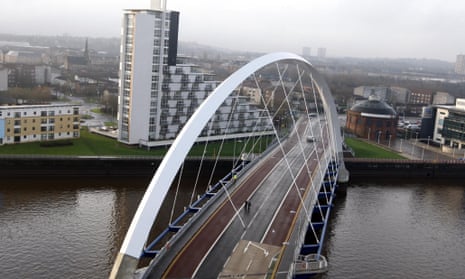They have come from São Paulo, San Francisco and Chicago, just to learn how Glasgow does it, because Glasgow, once the second city of the British empire, is now supposed to be the city of the future. City planners, civic leaders and technology officials from around the world want to know how it is transforming into possibly the most interconnected, smart and tech-driven metropolis on the planet.
Two years ago, Glasgow beat 29 rival cities to win a £24m pot of UK government cash. The money was not earmarked for regeneration, or housing projects or even renewable energy schemes. It was all to be spent on technology. The grant, from the Technology Strategy Board, was designed to transform the winning city into somewhere smarter, safer and more sustainable than anywhere else in Britain.
The main part of the project was recently completed, the money has been spent and Glasgow is supposed to be a future city. So, has it worked?
The project has not been without its problems. In 2014, five senior executives working on the project were dismissed following reports that they had been bidding for similar work with other bodies, without informing Glasgow city council. This included Future Cities director Michael McLaughlin. There have also been reports that the project, which is mostly been done by outside contractors, has caused friction within the council.
However, the main barrier that project managers found was a reluctance ingrained in much of local government to share data with anyone. As a core part of the project is a scheme to share as much data as possible, allowing all organisations to make better-informed decisions in Glasgow, this was a problem.
Gary Walker, the programme director of the Future City Glasgow project, says: “Change can be challenging – especially when you are driving something that appears to contradict everything you’ve had drummed into you for years. Initially, organisations were nervous when we asked them to release their data because people know they must protect it. But once they realised that we were not asking for sensitive or personal data they began to relax a little and appreciate the value in creating a data hub.
“It’s not surprising that there was some initial apprehension, but as awareness of the hub grows, and we now have 400 datasets, people are more open – no pun intended – to the opportunities that shared data can offer their own organisations and the city as a whole.”
Walker also says the two-year timetable was challenging, particularly as Glasgow was hosting the Commonwealth Games during that time. “The initial euphoria was quickly followed by the realisation that delivering such a huge, groundbreaking programme from a standing start in such a short time frame would be no mean feat,” he says.
“The complexity of the projects was a major factor,” Walker explains. “We weren’t just rolling out hardware and software or putting in new infrastructure, we were using technology in new ways and – especially in the case of the data hub – this was world-leading. A specialist programme of this scale and diversity also has a huge number of interdependencies and we needed specialist skilled staff from a multitude of disciplines.”
Despite all these hurdles the council insists the project has not only been a success, it has changed the city. For anybody wandering through Glasgow, looking at the buildings and streets, dodging the puddles and taxis, it is hard to see much difference. But a glance up, above the pavement, reveals intelligent street lights that get brighter for pedestrians and cyclists and dimmer if there is less activity. These report their own faults and record air pollution levels and weather details, as part of a network of sensors collecting statistics. The CCTV cameras are high-definition, wireless and connected to a central operations room.
Under the surface of the roads in Glasgow are sensors, operated by computers that read and analyse the data quicker than a person could, and adjust traffic lights to reduce bottlenecks. Much of the city is now mapped for residents and visitors, with walking tours, cycle routes and points of interest marked out on apps and websites. In Easterhouse, recovering alcoholics can access an internet map that shows places in their area that can distract them from the pub, from boxing clubs to rehab clinics.
These are just some of the main demonstrator projects, which are now all up and running. At the core of it all is the data collection hub, run by Glasgow city council at the headquarters of Community Safety Glasgow, near Bridgeton. There are health records, figures for footfall in each street, demographics, air pollution records – all of which the city can use to plan ahead, for business developments, schools and health services, for example. Crucially, there are no security issues because everything is made freely available and no personal records are collected.
The projects will be assessed over the next six months, both externally by market research company MRUK and internally by the Future City Glasgow team. If deemed successful, they could be rolled out to cities all over the country – while Glasgow moves forward with other innovative schemes. For Clare Holland, a spokesperson for Glasgow city council, this is not the end. She says: “We are looking at other avenues for funding. We are on the cusp of something here, the cusp of a new era of technology in the city and we want to take the momentum from that and build on it and take it forward.”
Sign up for your free weekly Guardian Public Leaders newsletter with news and analysis sent direct to you every Thursday. Follow us on Twitter via @Guardianpublic

Comments (…)
Sign in or create your Guardian account to join the discussion